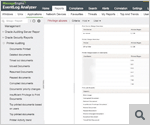Application Log Management
EventLog Analyzer is cost-effective, log management software that can centrally collect, analyze, and manage all your application logs to generate detailed reports and instant alerts to meet your IT security requirements.
The pre-defined application reports in EventLog Analyzer address both top events and trends. With the top event reports, you can identify the most commonly occurring events on your application. The trend reports help you analyze the performance of applications and identify anomalies.
Case Study
EventLog Analyzer helps First Mountain Bank stay Compliant with The Federal Deposit Insurance Corporation (FDIC) Audit Requirements - Read Online.
EventLog Analyzer supports a wide range of applications, including web servers such as MS IIS, FTP servers, and Apache; database applications such as MS SQL and Oracle; and DHCP Windows and Linux applications. Furthermore, the tool also supports the import of any human readable application logs and generates reports and alerts using its ULPI technology.
These reports help you analyze details of the top events generated, event trends, and more. These reports help an IT security manager effortlessly regulate delinquent users and uncharacteristic performance of applications. This in turn reduces the time spent in troubleshooting issues.
What can you do with EventLog Analyzer?
Web Server Log Analysis

EventLog Analyzer supports various web server applications such as IIS W3C, FTP servers, Apache, and more. With its out-of-the-box reports, you can get the following:
- Details of clients, users, file type access, page access, browser usage, OS usage
- HTTP Error Status Codes report and Malicious URL report
- File transfer details, reports categorized by file types, server services, server IP, and source ports.
- In-depth insights into the handling of requests from the client to the Apache web server.
- Detailed reports for Apache web server requests that are handled successfully, requests with client errors, requests with server errors, and requests leading to redirection.
- Client details like IP address, status code of the serviced request, referrer, user agent, and number of events.
Database Server Log Analysis
With EventLog Analyzer, you can monitor your MS SQL and Oracle database server applications.

The pre-defined reports for MS SQL database server include:
- The list of users generating maximum number of successful trusted logins, successful non-trusted logins, failed user logins, and insufficient resource events.
- Details of successful logins that help you track MS SQL application usage trends. Failed user logins are important for analyzing MS SQL application vulnerability to security breaches.
- Details on insufficient resource events help you to configure the MS SQL application to optimize usage.

Perform Oracle database auditing with ease using the following pre-built reports:
- System Management Reports include the system startup, shutdown, and alteration reports.
- Detailed Account Management Reports include the information on user creation, alteration, and deletion.
- Session Management Reports has the logon and logoff information.
- Object Management Event Reports include the details of tables created, altered, and dropped.
DHCP Application

EventLog Analyzer collects, monitors, and analyzes the log from both DHCP Windows and Linux applications. Out-of-the-box reports ,based on the log collection, provide you the detailed information on the list of events generated for Lease, BOOTP Lease, DNS dynamic update, rogue server detection, IP address, and MAC address. DHCP administrators will be able to view all of these reports, which will help the admins detect network problems instantly.
Print Server Reports

With EventLog Analyzer, you can easily monitor the usage of your print server to discover “who printed what document from which system and when." The pre-defined reports generated with the print server logs:
- Provide security angle to the usage of centralized printers in a network.
- Offer complete details about the users' printing activities, including name of the user, document ID and name, number of pages, printer used, size of the file, date and time of print, and ports used.
















